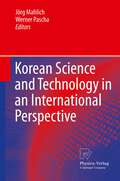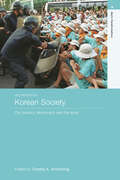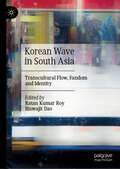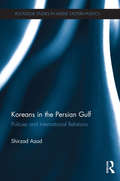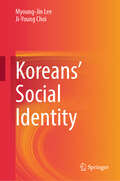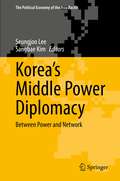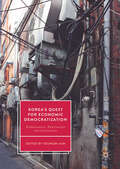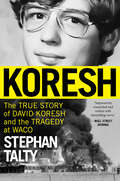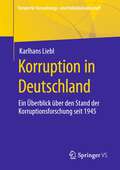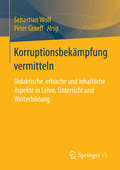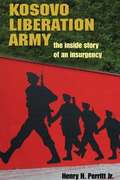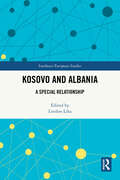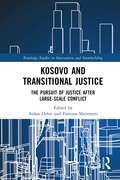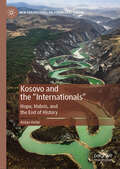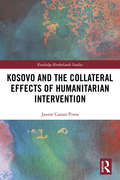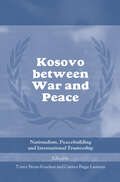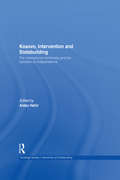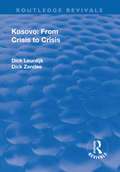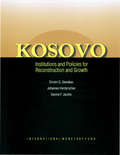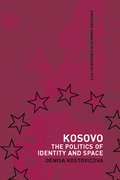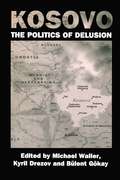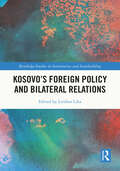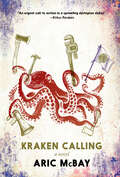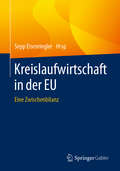- Table View
- List View
Korean Science and Technology in an International Perspective
by Werner Pascha Jörg MahlichSouth Korea has attained spectacular economic success in recent decades. It has reached the status of a Newly Advanced Economy, with challenges increasingly mirroring those faced by other advanced economies. These include the necessary upgrading of the labor force, the frictions of switching to a national system of innovation adapted to leadership in R&D, market-based economic policies that reflect the government's difficulties in foreseeing future technological developments, and the consequences of social change for the innovation system and policy-making. In the forthcoming book the parallel challenges for innovation and technology for the Republic of Korea and other advanced economies will be analyzed more thoroughly with an international perspective in mind. This comparison and international benchmarking will allow policy makers and scholars to better appreciate how much the country has already moved into the circle of globally leading economies and what can be done to consolidate and strengthen its position.
Korean Society: Civil Society, Democracy and the State (Asia's Transformations)
by Charles K. ArmstrongWhile most analyses of Korean politics have looked to elites to explain political change, this new and revised edition of Korean Society examines the role of ordinary people in this dramatic transformation. Taking the innovative theme of 'civil society' - voluntary organizations outside the role of the state which have participated in the process of political and social democratization - the essays collected here examine Korea as one of the most dramatic cases in the world of ordinary citizens participating in the transformation of politics. Key topics discussed include: comparisons of Korean democratization to the experiences of post-authoritarian regimes elsewhere in the world comparisons of the theory of civil society as developed in Western Europe and America the legacy of Korea's Confucian past for contemporary politics and society close examinations of various civil society movements South Korea and North Korea. Conceptually innovative, up-to-date and timely, the new edition of this book will be an invaluable resource for students of contemporary Korea, Asian politics and the global struggle for democracy.
Korean Wave in South Asia: Transcultural Flow, Fandom and Identity
by Biswajit Das Ratan Kumar RoyThis book is a systematic investigation of Korean cultural wave in South Asia, discovering and analysing the dynamics of fandom, mechanism of media industry and growing phenomena of Korean culture in this part of the world. This is one of the very first academic volumes in South Asia that examines cultural politics, language and literatures of Korea in a regional location when there might be some on examining the political and diplomatic relations divorced from socio-cultural interactions. It focuses on three major aspects: identity formation in the age of digital culture, fandom and aspiration in the wake of subculture, and transcultural flow in South Asia. Through these thematic indicators and empirical instances the volume explores the modes of transcultural flow vis a via the global cultural flow. The patterns and processes of identity construction transformed among the teenagers and youths in the realm of digital media and embodying the Korean cultural elements. The book will contribute in the area of media and cultural studies, global culture and politics, arts and humanities, social sciences and area studies.Chapter 1 is available open access under a Creative Commons Attribution 4.0 International License via link.springer.com.
Korean Workers and Neoliberal Globalization (Routledge Advances in Korean Studies #Vol. 11)
by Kevin GrayOne of the most remarkable aspects of South Korea’s transition from impoverished post-colonial nation to fully-fledged industrialized democracy has been the growth of its independent and dynamic labour movement. Korean Workers and Neoliberal Globalisation examines current trends and transformations within the Korean labour movement since the 1990s. It has been a common assumption that the ‘third wave’ of democratisation, the end of the Cold War, and the spread of neoliberal globalisation in the latter part of the 20th century have helped to create an environment in which organised labour is better placed to overcome bureaucratic national unionism and transform itself into a potential counter-globalisation movement. However, Kevin Gray argues that despite the apparent continued phenomena of labour militancy and the rhetoric of anti-neoliberalism, the mainstream independent labour movement in Korea has become increasingly institutionalised and bureaucratised into the new capitalist democracy. This process is demonstrated by the Korean Confederation of Trade Unions’ experience of participation in various forms of policy making forums. Gray suggests that as a result, the KCTU has failed to mount an effective challenge against processes of neoliberal restructuring and concomitant social polarisation. The Korean experience provides an excellent case study for understanding the relationship between organised labour and globalisation. Korean Workers and Neoliberal Globalisation will appeal to students and scholars of Korean studies and International Political Economy, as well as Asian politics and economics.
Koreans in the Persian Gulf: Policies and International Relations (Routledge Studies in Middle Eastern Politics)
by Shirzad AzadAnalyzing the Korean Peninsula's contemporary engagement with the Persian Gulf region from the 1950s to the present day, the book begins by asking the following question: What drew Koreans to the region in the first place and under what circumstances were they drawn there? While taking into account a combination of both external and internal factors shaping the dynamics of the Korean Peninsula's interactions with the Persian Gulf region, this book largely concentrates on the agency factor to analyze the nature and scope of a rather multifaceted relationship between the two areas. The Republic of Korea has, in fact, maintained diverse connections to every single country in the Persian Gulf over the past several decades, and its rather considerable activities and accomplishments in the region all justify such an overwhelming focus. The Democratic People's Republic of Korea's record in the Persian Gulf, however, is mostly limited to its relationship with Iran, though Pyongyang has pursued relationships with some other states in the region. This book studies the elements of Pyongyang's actions in the region as an appendage to South Korea's various political and economic achievements. Employing a process-tracing approach, this book will be of interest to policymakers, as well as to students and scholars of International Relations, Middle East Studies and Asian Studies.
Koreans' Social Identity
by Myoung-Jin Lee Ji-Young ChoiThis book examines the changing characteristics of Korean society and Koreans in various areas, including politics, economics, and society, providing rich analyses on social identity. Factoring in the trajectory of Korean history, the authors chart the rapid economic growth of Korea and the ways in which this has significantly improved Koreans' material living standards. The book shows that despite the Cold War and inter-Korean confrontation, active citizen participation has institutionalized democracy in Korea. A society once characterized by strong familial ties and patriarchal verticality has shifted to a more horizontal structure with diverse values. Transitions from agricultural to industrial and information societies have occurred within one or two generations. Rapid aging is another critical issue, with Korea experiencing one of the fastest aging trends globally. The shift toward a multicultural society challenges the traditional identity of Koreans based on a single ethnicity. Against this backdrop, this book seeks to capture the characteristics of changing Korean society and the people living in it, based on the concept of social identity that an individual's evaluation is not just a temporary personal feeling or prejudice but a cultural product. It allows for an objective analysis of a society or its cultural characteristics by measuring social identity. The first part of the book introduces the concept of social identity and presents analysis results in several fields. The second examines changes in the values and attitudes of representative Koreans. The third part discusses the social problems and tasks created by the changes in various values and attitudes. Finally, the last section explores concrete measures to overcome these problems and aim for social integration in future and emphasizes elements that enhance social trust and integration. It is relevant to sociologists and scholars working across various social science dimensions focused on Korea.
Korea’s Middle Power Diplomacy: Between Power and Network (The Political Economy of the Asia Pacific)
by Seungjoo Lee Sangbae KimThis volume discusses Korea’s role as a middle power in the midst of the 21st century global power shift. Focusing on Korea’s middle power diplomacy from the perspective of coalition building, the book discusses structural factors that shape middle power strategy and diplomacy. Written by leading Korean researchers, the chapters use diverse methodologies to offer a range of perspectives on Korea’s place in the developing global order. Topics discussed include South Korea’s approach to technology policy in the midst of US-China cyber competition, the East Asian ‘Thucydides Trap’, MITKA and middle power diplomacy, Korea’s role in the South China Sea dispute, and South Korean cyber security. Providing a unique treatment of middle power opportunities and motivations in the East Asia region, this volume will be of interest to students and scholars of international relations, Asian politics, diplomacy, security studies, and global governance.
Korea’s Quest for Economic Democratization
by Youngmi KimThis book studies the sources of inequality in contemporary South Korea and the social and political contention this engenders. Korean society is becoming more polarized. Demands for 'economic democratization' and a fairer redistribution of wealth occupy centre-stage of political campaigns, debates and discourse. The contributions offer perspectives on this wide-ranging socio-political change by examining the transformation of organized labour, civil society, the emergence of new cleavages in society, and the growing ethnic diversity of Korea's population. Bringing together a team of scholars on Korea's transition and democratization, the story the books tells is one of a society acutely divided by the neo-liberal policies that accompanied and followed the Asian financial crisis. Taken together, the contributions argue that tackling inequalities are challenges that Korean policy-makers can no longer postpone. The solution, however, cannot be imposed, once again, from the top down, but needs to arise from a broader conversation including all segments of Korean society. The book is intended for a readership interested in South Korean politics specifically, and global experiences in transition more generally.
Koresh: The True Story of David Koresh and the Tragedy at Waco
by Stephan Talty"Impressively researched and written with storytelling verve. ... Talty delves the deepest into the history and twisted personality of David Koresh." —Wall Street JournalThe first comprehensive account of David Koresh’s life, his road to Waco, and the rise of government mistrust in America, from a master of narrative nonfictionNo other event in the last fifty years is shrouded in myth like the 1993 siege of the Branch Davidians in Waco, Texas. Today, we remember this moment for the 76 people, including 20 children, who died in the fire; for its inspiration of the Oklahoma City bombing; and for the wave of anti-government militarism that followed. What we understand far less is what motivated the Davidians’ enigmatic leader, David Koresh.Drawing on first-time, exclusive interviews with Koresh’s family and survivors of the siege, bestselling author Stephan Talty paints a psychological portrait of this infamous icon of the 1990s. Born Vernon Howell into the hyper-masculine world of central Texas in the 1960s, Koresh experienced a childhood riven with abuse and isolation. He found a new version of himself in the halls of his local church, and love in the fundamentalist sect of the Branch Davidians. Later, with a new name and professed prophetic powers, Koresh ushered in a new era for the Davidians that prized his own sexual conquest as much as his followers’ faith. As one survivor has said, “What better way for a worthless child to feel worth than to become God?”In his signature immersive storytelling, Talty reveals how Koresh’s fixation on holy war, which would deliver the Davidians to their reward and confirm himself as Christ, collided with his paranoid obsession with firearms to destructive effect. Their deadly, 51-day standoff with the embattled FBI and ATF, he shows, embodied an anti-government ethic that continues to resonate today.Now, thirty years after that unforgettable moment, Koresh presents the tragedy at Waco—and the government mistrust it inspired—in its fullest context yet.
Korruption in Deutschland: Ein Überblick über den Stand der Korruptionsforschung seit 1945 (Forum für Verwaltungs‐ und Polizeiwissenschaft)
by Karlhans LieblDas Buch führt die wichtigsten Strömungen der Korruptionsforschung seit 1945 auf. Ein besonderes Augenmerk wird dabei auf die deutsche Forschungslandschaft gelegt. Weitere Schwerpunkte sind die Untersuchungen zum Umfang der Korruption, methdoische Probleme der Erhebung von Daten zur Korruption und Präventionsvorschläge. Letzterer Gesichtspunkt hat wieder einen besonderen Blick auf Deutschland. Abschließend werden die bisherigen Forschungen bewertet und Forderungen für zukünftige Untersuchungen dargelegt.
Korruptionsbekämpfung vermitteln: Didaktische, ethische und inhaltliche Aspekte in Lehre, Unterricht und Weiterbildung
by Sebastian Wolf Peter GraeffDer Band widmet sich der Vermittlung von Kompetenzen und Wissen zu den Themen Korruption und Korruptionsbekämpfung in unterschiedlichen Bildungseinrichtungen und Wissenschaftsdisziplinen. Es werden übergreifende methodische, empirische und theoretische Themen ebenso behandelt wie verschiedene Anwendungsfelder und Veranstaltungsformate. Die Bereiche Verwaltung, Wirtschaft und Zivilgesellschaft werden praxisnah angesprochen. Der Sammelband schließt eine Lücke in der wissenschaftlichen Korruptionsliteratur, die bisher überwiegend die Forschung, aber kaum die Perspektive der Wissensvermittlung in unterschiedlichen Kontexten thematisiert hat.
Kosovo Liberation Army: The Inside Story of an Insurgency
by Henry H. PerrittThe military intervention by NATO in Kosovo was portrayed in American media as a necessary step to prevent the Serbian armed forces from repeating the ethnic cleansing that had so deeply damaged the former Yugoslavia. Serbia trained its military on Kosovo because of an ongoing armed struggle by ethnic Albanians to wrest independence from Serbia. Warfare in the Balkans seemed to threaten the stability of Europe, as well as the peace and security of Kosovars, and yet armed resistance seemed to offer the only possibility of future stability. Leading the struggle against Serbia was the Kosovo Liberation Army, also known as the KLA. Kosovo Liberation Army: The Inside Story of an Insurgency provides a historical background for the KLA and describes its activities up to and including the NATO intervention. Henry H. Perritt Jr. offers firsthand insight into the motives and organization of a popular insurgency, detailing the strategies of recruitment, training, and financing that made the KLA one of the most successful insurgencies of the post-cold war era. This volume also tells the personal stories of young people who took up guns in response to repeated humiliation by "foreign occupiers," as they perceived the Serb police and intelligence personnel. Perritt illuminates the factors that led to the KLA's success, including its convergence with political developments in eastern Europe, its campaign for popular support both at home and abroad, and its participation in international negotiations and a peace settlement that helped pave the long road from war to peace.
Kosovo and Albania: A Special Relationship (Southeast European Studies)
by Liridon LikaThis book offers an original analysis of relations between the Republic of Kosovo and the Republic of Albania, with a particular focus on the 2008–2025 period. It provides an inside perspective bringing together scholarly contributions from academics, researchers, and diplomats from both countries. As Kosovo and Albania are inhabited by an overwhelming majority of ethnic Albanians, relations are fraternal, deep, and extensive, with the two states signing numerous agreements and memoranda in the political, economic, educational, cultural and security fields. This special relationship is explored through innovative and multidisciplinary approaches, thus making the study both timely and relevant.The book will be of key interest to scholars, diplomats, and students focusing on Political Science, International Relations, History, Kosovo’s foreign policy, Albania’s foreign policy, and Southeast Europe.
Kosovo and Transitional Justice: The Pursuit of Justice After Large Scale-Conflict (Routledge Studies in Intervention and Statebuilding)
by Aidan HehirThis book analyses efforts to achieve justice in Kosovo for victims of crimes committed during the conflict in the 1990s, relating this to broader debates on transitional justice. The war in Kosovo has come under the jurisdiction of a number of mechanisms which fit within the broader framework of transitional justice. These include international tribunals (the ICTY), international organisations with judicial mandates within Kosovo (UNMIK and EULEX), ad-hoc hybrid tribunals (the Kosovo Specialist Chambers) and truth-seeking mechanisms (RECOM and the Truth and Reconciliation Commission). Collectively, these developments make Kosovo a profoundly important case study on the contemporary efficacy of transitional justice. This volume analyses the nature and impact of the various mechanisms employed to date in Kosovo to determine their effects within the country, and their broader international significance. Various critical issues are examined through an exploration of the institutional mechanisms employed in each case, their coherence with existing theories on "best practice" principles, and the broader implications of their efficacy in Kosovo. This book will be of much interest to students of transitional justice, statebuilding, Balkan politics, and International Relations in general.
Kosovo and the "Internationals": Hope, Hubris, and the End of History (New Perspectives on South-East Europe)
by Aidan HehirThis book applies insights into the nature and impact of hope from medical studies and political philosophy to contemporary international politics. It shows how the promotion of hope was central to the rise of the West, focusing on the case of statebuilding in Kosovo – widely regarded as one of the most iconic Western initiatives in the unipolar era. The book explores the effects of hope on both the internationals charged with governing Kosovo and local residents, and how two related pathologies of hope – “wilful” and “wishful” – have aligned to slow Kosovo’s progress since 1999. The author argues that Kosovo’s current plight is indicative of both the West’s decline and the dark side of hope, vividly illustrating the perils of “bad hope”. Yet the book explains why “dashed hope” need not lead to despair or violence, and why local initiatives in Kosovo demonstrate groups’ and individuals’ agency in forging progressive movements based on the principles and strategies of “good hope”.
Kosovo and the Collateral Effects of Humanitarian Intervention (Routledge Borderlands Studies)
by Jaume Castan PinosHumanitarian intervention is rising ever higher in international relations discourse, with many publications exploring the nature, legality and success of these interventions. However, less attention is given to what happens after an intervention. This book looks in particular at the implications for territorial and border relations, exploring the case of Kosovo, which in many ways can be seen as a turning point in post-cold war international humanitarian intervention. The 1999 intervention has had significant consequences for Kosovo in terms of political transformations, territorial alterations and enclavisation, none of which was officially intended or foreseen when NATO intervened. Two decades after NATO’s intervention and a decade after unilaterally declaring independence, Kosovo continues to be confronted with daunting existential challenges that inevitably affect the stability of the region, border relations, and the credibility of the organisations operating within Kosovo, namely the UN, the EU and NATO. The book claims that not only is the political and territorial conflict far from being settled, but that the implications have gone beyond Kosovo, creating shock waves which have galvanised conflicts elsewhere. In effect, Kosovo has been used as a pretext, as a legitimation and as an inspiration for those who aspire to challenge the border status quo. The book is primarily aimed at undergraduate and postgraduate students of International Relations and Political Science and as well as Border Studies scholars, but will also appeal to researchers focusing on state-building, peace-building, humanitarian studies, nationalism/secessionism and Balkan studies.
Kosovo between War and Peace: Nationalism, Peacebuilding and International Trusteeship (Cass Series on Peacekeeping)
by Carsten Bagge Laustsen Tonny Brems KnudsenA major contribution to the debate about the reconstruction of Kosovo, and to the general discussion surrounding the revived 'trusteeship institution' model in the context of the UN internationalism of the 1990s and the War on Terror following 9/11. Bringing together leading international scholars, this book presents the latest empirical research alongside detailed theoretical analysis. Examining the key questions local parties and the international community have encountered in Kosovo, including how to develop effective and inclusive local government, how to counter crime and the dysfunctional aspects of liberal economic reform, how to unite the partly opposed goals of reconstructing the province while avoiding renewed ethnic and international strife, and how to handle the specific challenge of Kosovo’s future status. The contributors also re-examine the background factors that continue to influence and hamper the attempt to administrate and reconstruct the province, first of all the nationalist ideologies and the record of ethnic violence. This book will be of great interest to all students of Balkan politics, peacekeeping, international relations and security studies in general.
Kosovo, Intervention and Statebuilding: The International Community and the Transition to Independence (Routledge Studies in Intervention and Statebuilding)
by Aidan HehirThis book examines international engagement with Kosovo since NATO's intervention in 1999, and looks at the three distinct phases of Kosovo's development; intervention, statebuilding and independence. Kosovo remains a case study of central importance in international relations, illustrative of key political trends in the post-Cold War era. During each phase, international policy towards Kosovo has challenged prevailing international norms and pushed the boundaries of conventional wisdom. In each of the three phases 'Kosovo' has been cited as constituting a precedent, and this book explores the impact and the often troubling consequences and implications of these precedents. This book explicitly engages with this debate, which transcends Kosovo itself, and provides a critical analysis of the catalysts and consequences of contemporary international engagement with this seminal case study. Each chapter focuses on a particular aspect of the international engagement with Kosovo and situates events there in an international context, highlighting the extent to which international policy towards Kosovo has challenged existing norms and practices. Kosovo has been cited in certain texts as a positive template to be emulated, but the contributors to this book also identify the often controversial and contentious nature of these new norms. This book will be of much interest to students of humanitarian intervention and statebuilding, war and conflict studies, security studies and IR in general. Aidan Hehir is a Senior Lecturer in International Relations at the Department of Politics and International Relations, University of Westminster.
Kosovo: From Crisis To Crisis (Routledge Revivals)
by Dick Leurdijk Dick ZandeeThis title was first published in 2001. Kosovo: From Crisis to Crisis deals with the main features of the most recent crisis, leading up to operation Allied Force. It provides an excellent analysis of all major aspects of NATO’s intervention and it discusses the current problems with the implementation of the settlement. Until recently, Kosovo was a rather unknown territory in a far-away corner of Europe. The Serbian-Albanian armed conflict, NATO's intervention and the following struggle by the international community to rebuild this area has turned Kosovo into terra cognita for diplomats, politicians, the military, aid workers and the public. Essential reading for political scientists with special interest in ethnic and conflict studies.
Kosovo: Institutions and Policies for Reconstruction and Growth
by Dimitri G. Demekas Davina F. Jacobs Johannes HerderscheeA report from the International Monetary Fund.
Kosovo: The Politics of Identity and Space (Routledge Advances in European Politics #Vol. 29)
by Dr Denisa KostovicovaKosovo: The Politics of Identity and Space explores the Albanian-Serbian confrontation after Slobodan Milosevic's rise to power and the policy of repression in Kosovo through the lens of the Kosovo education system. The argument is woven around the story of imposed ethnic segregation in Kosovo's education, and its impact on the emergence of exclusive notions of nation and homeland among the Serbian and Albanian youth in the 1990s. The book also critically explores the wider context of the Albanian non-violent resistance, including the emergence of the parallel state and its weaknesses. Kosovo: The Politics of Identity and Space not only provides an insight into events that led to the bloodshed in Kosovo in the late 1990s, but also shows that the legacy of segregation is one of the major challenges the international community faces in its efforts to establish an integrated multi-ethnic society in the territory.
Kosovo: the Politics of Delusion
by Michael Waller Kyril Drezov Bülent GòkayThis collection examines the escalation of the Kosovo conflict to a full-scale war. It looks at its origins, background and the implications of the conflict: the myths, history and perceptions of the post-1989 crisis and the situation after the start of NATOs 1999 bombing campaign.
Kosovo’s Foreign Policy and Bilateral Relations (Routledge Studies in Intervention and Statebuilding)
by Liridon LikaThis edited book analyzes Kosovo’s foreign policy and bilateral relations with the United States and several European countries. After the 1999 liberation from Serbia, Kosovo built close relations with various countries that supported it in the process of reconstruction, economic stabilization, institution-building, and state-building. From 1999 to 2008, many of these states were politically and operationally engaged in Kosovo under the leadership of the North Atlantic Treaty Organization (NATO) and of the United Nations Interim Administration Mission in Kosovo (UNMIK). Since its independence in 2008, the Republic of Kosovo has adopted a foreign policy in accordance with its values and strategic interests, a foreign policy that aims to strengthen Kosovo’s security and foster its socio-economic prosperity in collaboration with primarily Western countries. In this volume, each chapter is dedicated to Kosovo’s bilateral relations with a selected state with which it has established diplomatic relations. The book shows that Kosovo has been able to develop and achieve strong bilateral relations with major allies and partners. It argues that Kosovo’s foreign policy aims to develop, maintain, and enhance the position of the young state on the international stage. The volume bridges various methodological and disciplinary approaches in order to present Kosovo’s foreign policy objectives and the trajectory of its relations with some of its most important international partners. This book will be of interest to students of Balkan politics, state-building, foreign policy, and International Relations.
Kraken Calling: A Novel
by Aric McBayA sweeping near future dystopic fantasy in the Octavia Butlerian vein of the Parable of the Sower novels. Political activist and anarchist author Aric McBay (Full Spectrum Resistance) toggles between the years 2028 and 2051 to give us the experience, with breathtaking realism, of what might happen in the span of just one generation to a society that is already on the brink of collapse. In 2028 environmental activists hesitate to take the fight to the extreme of violent revolution. Twenty years later, with the natural environment now seriously degraded, the revolution is brought to the activists, rather than the other way around, by an authoritarian government willing to resort to violence, willing to let the majority suffer from hunger and poverty, in order to control its citizens when the government can no longer provide them with a decent quality of life. So it is the activists who must defend their communities, their neighbors, through a more humane and in some ways more conservative status quo of care and moderation. And the outcome here is determined by the actions of those who resist more than it is by the actions of the nominally powerful.
Kreislaufwirtschaft in der EU: Eine Zwischenbilanz
by Sepp EisenrieglerDie Implementierung der Kreislaufwirtschaft bedeutet eine große Transformation von einer ressourcenvernichtenden, linearen zu einer enkeltauglichen, zirkulären Wirtschaftsweise. Sie ist nicht konzipiert ohne Wachstum auszukommen. Allerdings ist die Postwachstumsökonomie, wie sie einige Autoren zu Recht fordern, derzeit politisch nicht anschlussfähig. Progressive Wissenschaftler empfehlen seit Jahrzehnten Dienstleistungen statt Produkteigentum, Sharing- und Reuse-Modelle und eine generelle Abkehr vom Wachstumsparadigma, um unsere imperiale Lebensweise auf ein sozialökologisch vertretbares Maß zu reduzieren.Dieses Buch stellt eine Zwischenbilanz zur Implementierung einer Kreislaufwirtschaft in der EU dar. Es wird offengelegt, was sich, öffentlich weitgehend nicht wahrgenommen, in den EU-Institutionen getan hat, welche wissenschaftlichen Grundlagen vorhanden sind und was NGOs darüber hinaus fordern. Renommierte Autoren liefern überzeugende Argumente für den Ausstieg aus dem Hamsterrad der materiellen Bedürfnisbefriedigung und zeigen auf, dass das Primat der Wirtschaft einem guten Leben für alle im Wege steht.
